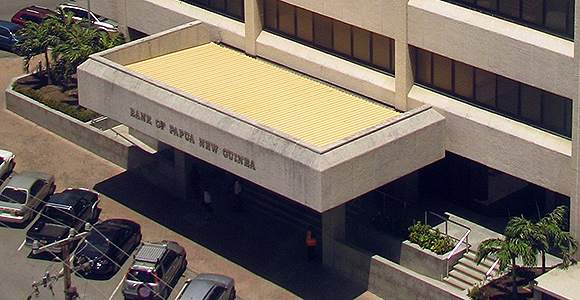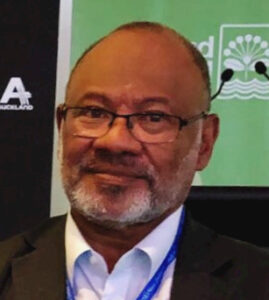Chairman of the Bank of Papua New Guinea, David Toua, talks exclusively to Business Advantage PNG about reforms to the country’s central bank, the foreign exchange situation, interest rates and the phasing out of bank cheques.

The Bank of Papua New Guinea building in downtown Port Moresby. Credit: BAI
Business Advantage PNG: What are the main achievements of the bank’s modernisation efforts, and what issues remain to be addressed?

Bank of PNG Chairman, David Toua
David Toua: Firstly, let me first applaud the government for its decision to permanently appoint Elizabeth Genia as the eighth Governor of the Bank of Papua New Guinea, which brings leadership permanency to the bank and board that is critical at a time when the institution manages a significant reform agenda brought about by legislative change.
In 2021, for the first time in 20 years, PNG’s Central Banking Act was significantly revised and updated to reflect changes in the national and international financial system. The biggest impact of this change was to recognise that the bank has a role to play in the health of the economy beyond price stability.
The bank has long taken the view that financial inclusion is a key part of our operations – despite more inclusive technologies, our country is still one of the least banked in the world. But the changes to the Central Banking Act recognised that the actions of the bank have an impact on jobs and economic growth, and that we need to consider this when formulating monetary policy.
In 2023, we also completed our Strategy 2050 process, which aligns with the Government’s Vision 2050.
Technology has changed rapidly since the bank was established, and our services and approach need to change with it. We were already looking at innovation through new technologies like blockchain, but our strategy will see technology and innovation integrated throughout our operations.
The real work is in the implementation and that will be our challenge as a board over the next two years.
“The only way this will change is if we are able to significantly increase economic activity in Papua New Guinea and stop the outflow of currency.”
Business Advantage PNG: How will the central bank improve the availability of foreign exchange?
David Toua: Our challenges with foreign exchange extend beyond the control of the Bank of PNG.
The simple explanation is that we are receiving far less foreign exchange than we need, and that imbalance is unsustainable. The reasons for that are multi-faceted, but include funds being held offshore by major exporters, and some significant disincentives to bring money into PNG.
BPNG significantly increased the amount of currency available in 2023, injecting over US$1.5 billion into the market, but even that was not enough to satisfy demand.
The only way this will change is if we are able to significantly increase economic activity in Papua New Guinea and stop the outflow of currency.
One important way to do this is to increase the number of successful and growing businesses owned and operated by Papua New Guineans. We need more businesses that want to keep their profits onshore, rather than send them overseas. We need to identify services we can export, like tourism and financial services, and build them up so that they become drivers of economic growth.
Business Advantage PNG: Have there been changes to the bank’s plan to phase out cheques as of 31 December last year?
David Toua: The phasing out of cheques makes sense and is inevitable, but recently raised public and political concern suggests further stakeholder awareness and education is required.
Cheque usage has been declining for over a decade, and this decline has accelerated in the past two years. Cheques now account for only 7% of all transactions, down from 44% in 2015.
“We are also moving to open the market for Central Bank Bills to increase competition and allow new buyers”
I’ll note that the decision to end cheques is ultimately one for the commercial banks. The National Payments Council has agreed to allow those already holding cheques to use them for another six months, to the end of June 2024. But no new chequebooks will be issued, and most customers have already moved to alternative forms of payment.
Business Advantage PNG: How is the bank working to maintain a robust monetary policy framework, regarding interest rates?
David Toua: Unlike other countries, there is a weak link between official interest rates and those set by the commercial banks.
This is because our banking system is too liquid – our commercial banks do not need to borrow from the government to lend, and therefore the interest rate set by government does not affect their activities.
This means our monetary policy framework is hindered in its ability to ensure price stability, much less keep it under control.
To counter this, in August 2023 we introduced a fixed rate, 7-day Central Bank Bill auction with no pre-determined limit on a bid amount, to absorb some of the excess liquidity.
While there are some structural issues we need to address on the concentration of excess deposits and where they are held, the 7-day Bill auction is working as we expected.
We are also moving to open the market for Central Bank Bills to increase competition and allow new buyers, including individual investors, to purchase bills.









Speak Your Mind